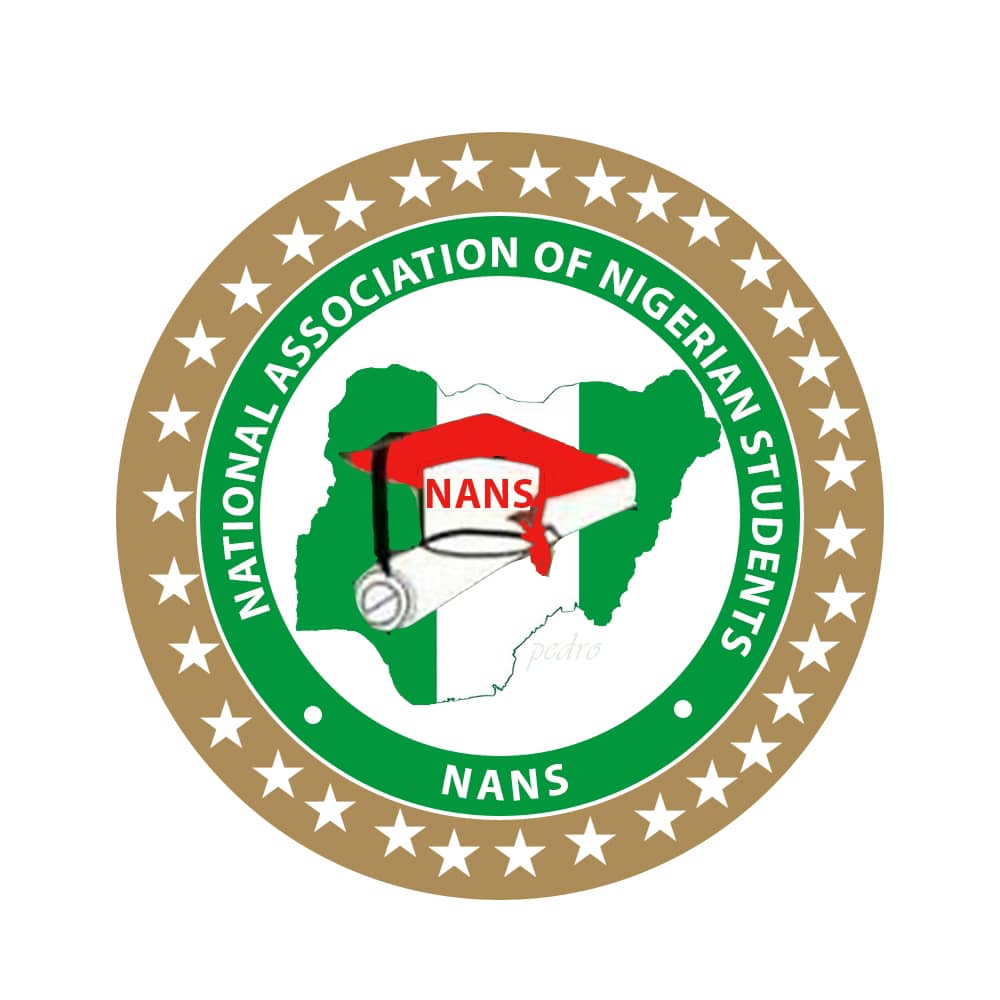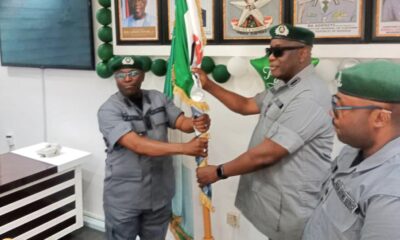Top Story
Seaport: Shareholders lament as N8bn Customs scanners fail physical scanning
…Pharmaceutical products cannot undergo scanning due to limitations – Customs
By Seun Ibiyemi
Despite the federal government’s multi-billion naira investment in scanners at the nation’s seaports, the Nigeria Customs Service (NCS), operating at the seaports has abandoned the equipment for 100 per cent physical examination of cargoes. This excludes products and others that cannot undergo scanning due to limitations of the scanners.
The 100 per cent physical examination as added value demmurage charges accruing for importers who had thought the introduction of scanners will reduce cost of clearing cargoes out of the nation’s seaports.
However, checks by Nigerian NewsDirect revealed that despite the launch of the scanners at Nigeria’s two busiest ports of Apapa and Tin-Can, cargoes still undergo 100 per cent physical examination at these ports, thereby slowing down cargo clearance chain at the ports.
Recall that the N8billion Scanner project was commissioned recently by the Minister of Finance, Zainab Ahmed. She said that the project would no doubt aid the NCS in the delivery of its mandates, in line with the key priorities of, President Muhammadu Buhari-led Administration targeted at reducing poverty and stimulating favourable macroeconomic conditions for sustained growth and development.
According to her, the scanner has the capacity to detect prohibited import concealed in cargoes, adding that it enables more cargoes to be scanned and bring about the desired efficiency and effectiveness in cargo examination processes.
“The commissioning of these three non-intrusive scanners is in line with efforts to expedite Customs operations and achieve its mandate of ease of doing business, trade facilitation and preventing port congestion.
“These three scanners will help increase revenue for government and improve national security. It will also help enhance the remote audit trail of goods within the port system,” she said.
The Minister stated that the equipment have the capacity to process up to 500 containers in a day, asking for cooperation of key stakeholders.
Meanwhile speaking on the functionality of the scanners, a member of National Council of Managing Director of Licensed Customs Agents (NCMDLCA), Humphrey Okwuosa said cargoes still undergo 100 per cent physical examination at seaports.
According to him, “Customs lacks proper training for the utilisation of the scanners as most results they get to send cargoes form 100 per cent examination are false.”
He said, “Most of the scanners are not properly or adequately operated, their system is yet to be in sync with it. They still go for 100 per cent examination even when there is no infractions and this is wrong.”
However, he said the organisation is yet to have a scanning machine that will give correct report what the items in the containers are.
“The Customs should send more of its officers on training to be able to use the machine rightly and correctly. The officers still do 100 per cent physical examination, because after scanning, they must find one error or the other and most of the time are wrong after getting the scanning report but they use it to delay people for whatever reasons.
“For now, almost all containers are going through physical examination, in fact 80 per cent of containers are going through physical examination, so what’s the essence of a scanner?” he asked.
Also, the Public Relations Officer, African Association of Professional Freight Forwarders of Nigeria (APFFLON), Tin Can Island Port Complex, Clinton Okoro, said the Customs had told clearing agents that cargoes will be scanned from the seaside, even before, getting to the terminal, a situation he said was a ruse.
According to Okoro, 90 per cent of containers are going through 100 percent cargo examination, saying cargoes spend over one week instead of three days before exiting the seaports.
He said, “What we see in the media concerning the scanning machines was a mirage. What they told us when we went for the workshop at Apapa was that the scanners will be installed at the berthing area and all the containers will be scanned. Once they are scanned, there won’t be the hassle of going through rigorous exercise of conducting another examination at the terminal, but as it is now, nothing like that, we still have our normal 100 per cent examination, and of course, you know lot of issues we are facing such as delays.
Meanwhile the Nigeria Customs Service (NCS) has accused terminal operators and clearing agents of sabotaging the utilisation of the newly installed N8billion scanners at the nation’s seaports.
The Customs Area Controller of TinCan Island Ports, Adekunle Oloyede, who disclosed this to journalists at the Command recently, said terminal operators aided the non-compliance level of scanning cargoes with their refusal to provide trucks to take cargoes to the scanning site.
He said the clearing agents have also not been compliant due to fear of being exposed, thereby making examination and clearing of containers cumbersome.
“At least, 80 per cent of containers should go through the scanner and those that do not have a query should be released immediately. But even the terminal operators find it difficult to provide trucks, which will bring the containers to the scanning. We can’t work in silos,” he said.
Oloyede said that even if there are 80 scanners, the terminal operators are not willing to provide trucks, noting that Customs intend to buy more mobile scanners and place them by the quay to scan containers.
“To make sure compliance level is compulsory, the scanning machines will be at the quayside because they are mobile machines that can move from one point to another. So, if I have three mobile scanners at the quayside, it is enough for Tin Can port. I can put two mobile scanners for the trucks to load.
“The scanners can scan under 30 seconds for a 20ft container and 55 seconds for a 40ft container. So, we can scan 400 in a day with this analysis, even more than that because at that point I am not analysing, I am only scanning for record purposes.”
Speaking on the development, the Spokesman of the Apapa Customs Command, Abubakar Usman explained that some cargoes like pharmaceutical products cannot undergo scanning due to limitations of the scanners, thereby forcing the Service to still inspect such cargoes manually.
According to the Apapa Customs Command Spokesman, “Currently, the scanners deployed at the ports cannot examine pharmaceutical products.
“The scanners cannot tell us if a pharmaceutical product is a malaria drug or an antibiotic or a pain reliever. The scanners cannot say if a drug has expired or even tell us when it will expire.
“The scanners cannot tell us if a pharmaceutical drug is approved by the National Agency for Food and Drug Administration and Control (NAFDAC) or not. This is why when such cargoes come into the ports, we move them for 100 per cent physical examination.
“We are expecting more scanners, and hopefully when more scanners arrive, we will be able to reduce the number of cargoes examined manually. But as of today, pharmaceutical cargoes that arrive the ports goes under manual examination.”
Speaking on the capacity of the scanner, Usman added that aside pharmaceutical cargoes, the scanners are doing very well.
“Aside pharmaceutical cargoes, the scanner is working perfectly well at the ports and on a daily basis, we scan around 100 and 150 containers depending on the numbers of containers positioned for examination by the Terminal operators,” the Apapa Customs Spokesman added.
Top Story
Fuel scarcity: MEMAN confirms availability of 300 million litres of petrol, works to end delivery glitch


…As Reps summon Petroleum Minister, other stakeholders over rising petrol prices
The Major Energy Marketers Association of Nigeria (MEMAN) has announced that Premium Motor Spirit (PMS), also known as petrol, is now available and that it is working with key stakeholders to resolve the current product delivery issues.
In a statement issued in Lagos, MEMAN revealed that its members in Apapa and other locations in Lagos are receiving product from 8 vessels this week, totaling over 300 million litres of PMS, which is significantly above normal levels.
According to the statement, “We are actively coordinating with our member companies through swaps and other supply arrangements to ensure that our member stations remain stocked and that the product is delivered to consumers without any further disruptions.
“We are actively coordinating with our member companies through swaps and other supply arrangements to ensure member stations remain stocked.
“Our depots will extend their loading times to ensure we load out as much as we can including tomorrow the 1st of May 2024.
“Our partners in NARTO & PTD have assured us of their support in ensuring the product gets to the retail outlets safely and quickly. We also will extend the opening times of selected retail outlets to ensure we can service our customers as long and as safely possible.
“Independent marketers (depots and stations) are being allocated additional PMS to alleviate the situation.
“We expect the situation to improve in the coming days as supply chains adjust and stabilise.”
“Despite the challenges posed by the return of fuel queues, MEMAN assures the public of its unwavering commitment to keeping them informed and providing regular updates.
“MEMAN deeply empathises with Nigerians facing the challenges occasioned by the current availability of Premium Motor Spirit (PMS) and the resulting queues at many retail outlets.
“We can see the frustration and difficulties this situation is creating. The Downstream Regulator, NMDPRA and other key stakeholders across the supply chain are fully engaged and supportive to eliminate the queues as swiftly as possible.
“Our top priority is to restore stability and ensure that fuel supplies reach all depots and retail outlets across Nigeria promptly. While the current situation has been challenging, we want to reassure the public that there is an adequate supply of PMS available,” the association confirmed.
…Reps summon Petroleum Minister, other stakeholders over rising petrol prices
Meanwhile, the House of Representatives has taken decisive action in response to the ongoing fuel scarcity gripping Nigeria, summoning the Minister of Petroleum Resources and other key stakeholders within the petroleum industry.
The move comes after the adoption of a motion titled “The Need To Address The Lingering Fuel Scarcity And Rising Retail Prices Of Premium Motor Spirit (PMS) Across Nigeria,” presented by Rep. Umar Shehu Ajilo during Tuesday’s plenary session.
The summoned stakeholders are expected to provide comprehensive briefings to the Assembly, outlining the measures in place to mitigate the existing crisis and prevent similar situations from arising.
“Concerned that this fuel scarcity is coming at a time when the adverse economic effect caused by subsidy removal and soaring inflation is yet to be addressed by the government, not to mention the deteriorating income of the Nigerian masses.
“Further concerned that the Nigerian National Petroleum Corporation Ltd is yet to address this perennial and persistent fuel scarcity problem faced by Nigerians despite the volume of resources at its disposal.
“Most worrisome that all these economic quagmires have made the lives of average Nigerians unbearable with a litre of fuel selling as much as N1,200 in some states of the Federation.
“This 10th Assembly must rise to the occasion to ensure that lasting measures are taken to address this unfortunate and embarrassing situation permanently in the interest of all Nigerians.”
However, Mr. Ajilo appealed to the House to extend invitations to the Minister of Petroleum Resources and pertinent stakeholders in the petroleum sector to convene before the assembly.
Top Story
NANS to embark on nationwide protest on May 7 over fuel scarcity, electricity crisis


By Sodiq Adelakun
The National Association of Nigerian Students (NANS) has announced plans to stage a nationwide protest on May 7, to demand urgent action from the government to address the persistent fuel scarcity and electricity crisis plaguing the country.
According to a statement issued by the Senate President of NANS, Akinteye Babatunde, the student body has been left with no choice but to take to the streets due to the government’s inability to effectively tackle these pressing issues.
The association expressed its deep disappointment and frustration over the continued hardships imposed on students across Nigeria due to the ongoing energy crises.
The protest, scheduled to take place in major cities and towns across the country, aims to amplify the voices of the student community and pressure the government to find lasting solutions to the fuel scarcity and electricity crisis, which have severely impacted the academic and social lives of students.
“We are mobilising for a nationwide protest to demand the removal of key officials responsible for exacerbating these issues,” Babatunde stated, highlighting the urgency of their demands.
NANS has launched protests targeting high-profile figures. Specifically, the Group Chief Executive Officer of the Nigerian National Petroleum Corporation Limited, Mele Kyari, and the Minister for Power, Bayo Adelabu, are under fire for their alleged mismanagement contributing to the energy woes.
NANS accuses Kyari and Adelabu of overseeing a leadership marked by severe mismanagement of crucial energy resources, exacerbating the nation’s turmoil.
The student body’s strategic protest plan spans various zones across the country, ensuring widespread participation and visibility.
Designated protest locations include Abuja Junction along the Abuja-Kaduna Expressway, Airport Road in Abuja, Lagos-Ibadan Expressway, Onitsha-Asaba Head Bridge, and Wuntin Dada along the Bauchi-Jos Road.
Babatunde added, “This is a collective stand against the systemic failures and neglect that have perpetuated a cycle of hardship and suffering among the populace.”
Top Story
Reps halt implementation of new electricity tariff


The House of Representatives has urged the Nigeria Electricity Regulatory Commission (NERC) to suspend the implementation of the new tariff.
The call was sequel to the adoption of a motion by Rep. Nkemkanma Kama (LP-Ebonyi) at plenary on Tuesday.
It would be recalled that NERC had one April 3, approved an increase in electricity tariff for customers who enjoyed 20 hours of electricity daily classified as Band A users.
Moving the motion, Kama said that the aim was to restore public trust, protect consumer rights, and ensure regulatory accountability in the Nigerian Electricity Supply Industry (NESI).
He said that facts presented showed that the approval granted by NERC resulted in a staggering 300 per cent rise for certain consumers.
“What is more concerning are the reports indicating discrepancies in customer categorisation and widespread complaints regarding inadequate service despite increased charges.
“This situation has not just sparked national anxiety, but it also threatens regulatory certainty and investor confidence in the sector, demanding immediate attention.
“This motion argues for legislative intervention, underlining our constitutional and moral obligations to address the crisis and alleviate the burden on Nigerian citizens.
“It places a strong emphasis on the legislative oversight role over NERC and the electricity utilities, stressing the need for fair and just pricing and consultation with stakeholders in tariff determination processes.
“This is not just a responsibility, but a duty we owe to our constituents,” he said.
The lawmaker alleged failure of due process in approving the tariff increase which raised concerns over discriminatory practices, and disputed the nature of government subsidies to Electricity Distribution Companies (DISCOs).
Sequel to the adoption of the motion, the House ordered the Nigerian electricity regulatory commission (NERC) to suspend the operation of the recently announced tariff increases and other conditions in the newly issued review of the MYTO.
The House resolved to set up a special committee made up of the Committees on Power, Commerce and National Planning to convene a public hearing on price regulation.
The lawmaker resolved to appoint a well-regarded former regulator as technical consultant to the house to develop templates for determination of the legality, reasonableness of the procedure adopted by NERC in approving the tariff increase and establishing the performance benchmarks for the Discos.
In his ruling, the Speaker of the house, Rep. Tajudeen Abbas said that the relevant committees should ensure compliance.
-
capital market2 years ago
Rt.briscoe, FBNH, Others halts negative performance of stock market
-
Finance3 months ago
Court orders Sen. Victor Umeh to repay N136m bank debt to AMCON
-



 Abuja Update2 months ago
Abuja Update2 months agoUNDP, FG partnership needed to achieve inclusion, equity- Minister
-
Abuja Update1 month ago
Banks drive stock market performance with N147bn gain
-



 Business1 week ago
Business1 week agoTingo Group unveils Tingo Electric, Tingo Cola drink at Lagos launch
-



 Health2 weeks ago
Health2 weeks agoCapacity training will reduce migration of health workers- NPHCDA
-
News4 months ago
Oil thieves sponsoring malicious media campaign against Navy – Spokesman
-



 Infotech1 month ago
Infotech1 month agoWorld Backup Day: NITDA urges Nigerians to ensure backup of data
















